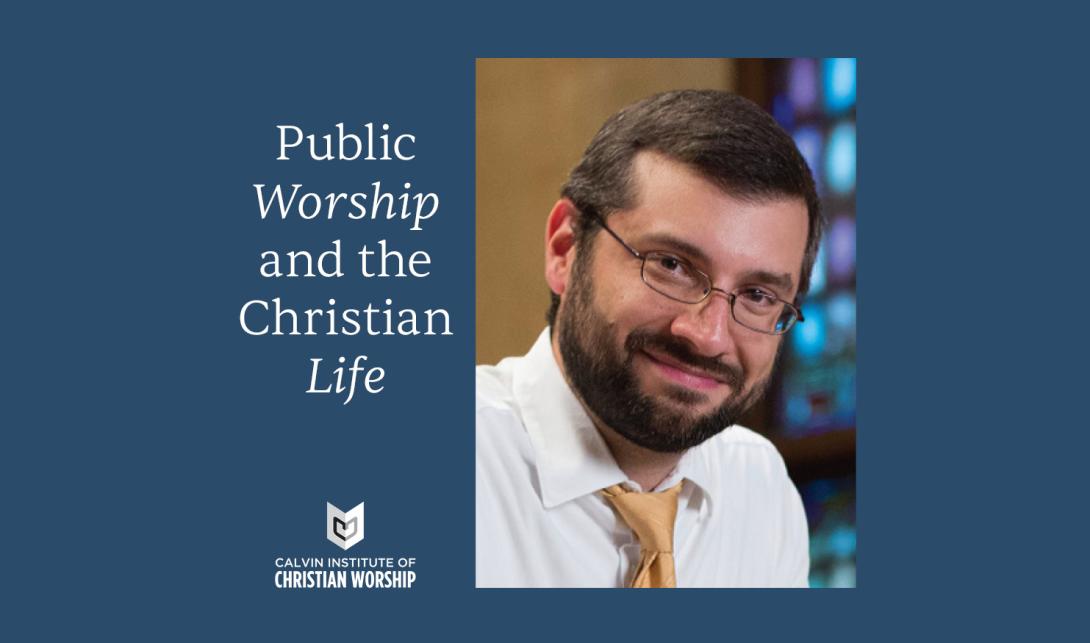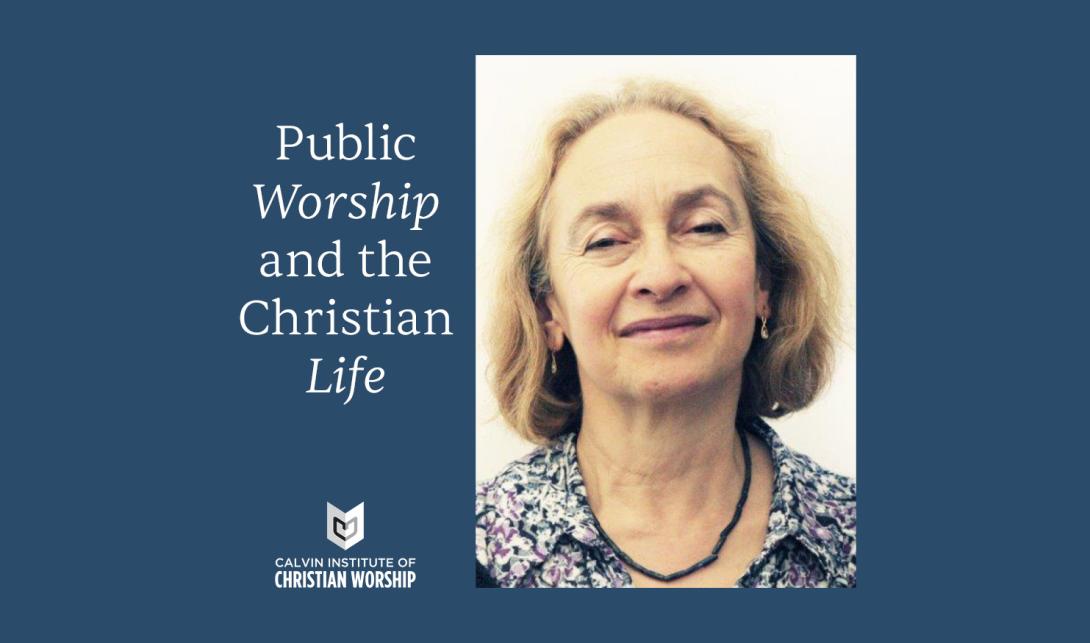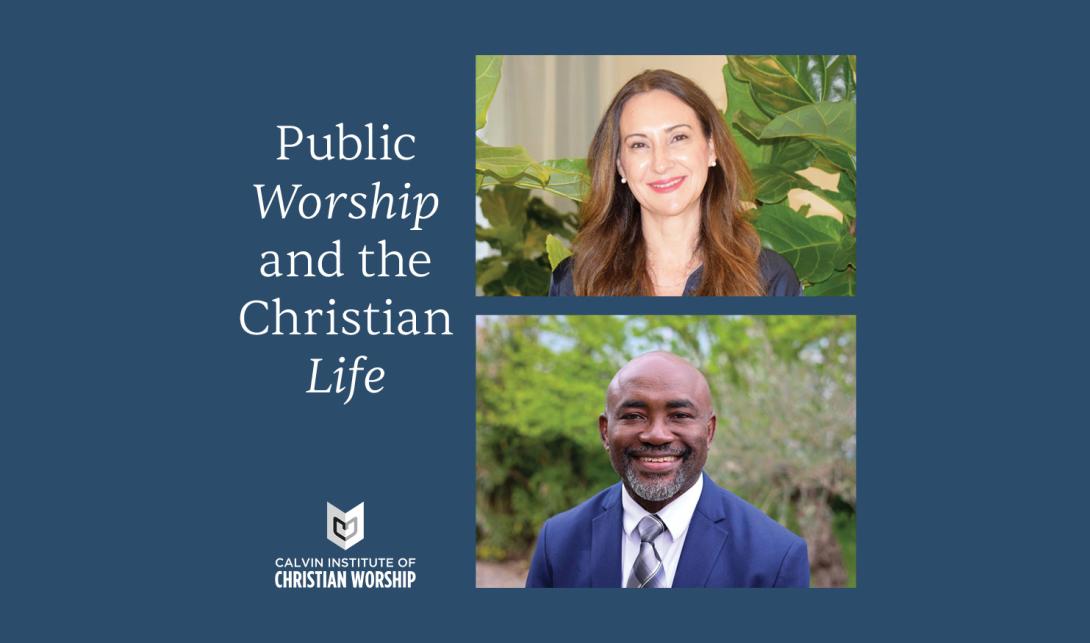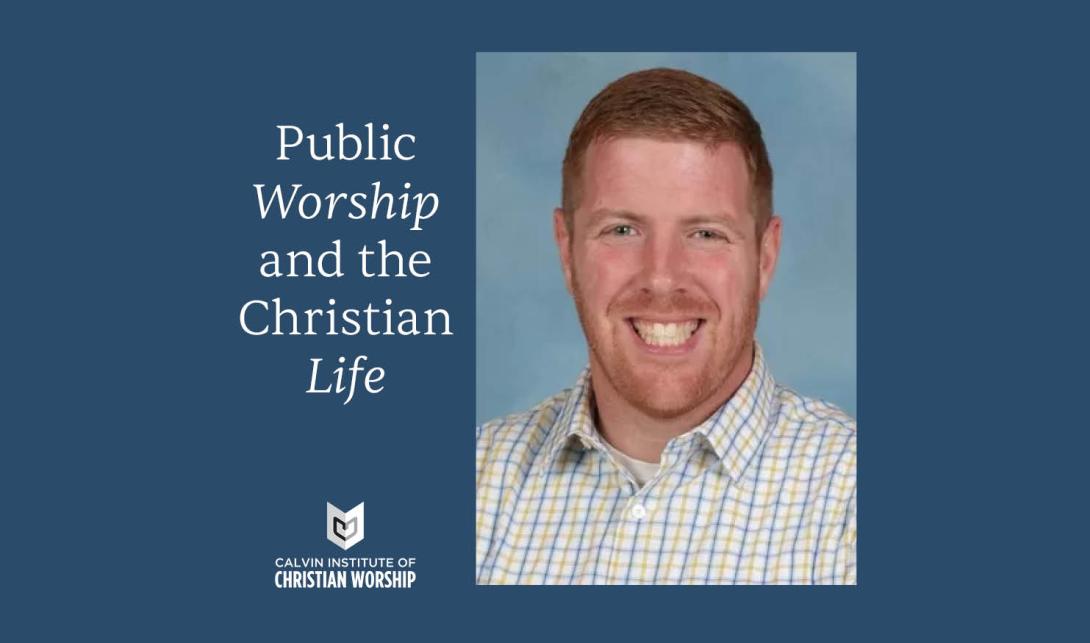Listen on Spotify, Google Podcasts, Amazon Music, Pandora, RSS Feed.
This interview occurred in the fall of 2020 as part of a course "Learning from Worshiping Communities Worldwide" offered by Calvin Theological Seminary and taught by Calvin Institute of Christian Worship staff Maria Cornou and John D. Witvliet.
Episode Transcript:
Host:
Welcome to Public Worship and the Christian Life, a podcast by the Calvin Institute of Christian Worship. In this series of conversations hosted by Calvin Institute of Christian Worship staff members, we invite you to explore connections between the public worship practices of congregations and the dynamics of Christian life and witness in a variety of cultural contexts, including places of work, education, community development, artistic and media engagement, and more. Our conversation partners represent many areas of expertise and a range of Christian traditions offering insights to challenge us as we discern the shape of faithful worship and witness in our own communities. Mitri Raheb is a theologian, public figure, widely published author, and for thirty years senior pastor of Evangelical Lutheran Christmas Church in Bethlehem. In this episode, Rev. Raheb talks with John Witvliet, director of the Calvin Institute of Christian Worship, on the impact of the COVID-19 pandemic on the worshiping community in Bethlehem, the birthplace of Jesus.
John Witvliet:
It is my great joy today to be in conversation with Mitri Raheb. I'm speaking from Grand Rapids, Michigan, and Mitri, you're speaking to us from Bethlehem and Palestine, correct?
Mitri Raheb:
Correct.
John Witvliet:
And we're recording this in September of 2020. Who could have imagined what this year would have brought for all of us. Would you say a little bit about what it's been like for your community in Bethlehem, especially with the experience of the COVID pandemic this year?
Mitri Raheb:
Yeah, actually, you know, the first cases of infection with COVID - 19 in Palestine were discovered in Bethlehem on March 5th. So it was really a few days after cases were discovered in Washington state in the US, and it seems that the virus came through to these groups who were staying in Bethlehem and the Palestinian government actually was able to react immediately by shutting down Bethlehem and declaring curfew. So we were in curfew for almost a month. And within this month, the pandemic was able to be contained fully, but we continued to be under lockdown for another two months. So totally we were 83 days under lockdown. You can imagine the first infections were announced on the 5th of March in the morning, maybe by 10. All hotels were evacuated that same day, and that same evening we were put under curfew. Now, for a city like Bethlehem, this pandemic is really a catastrophe, because Bethlehem as a city, because it's the birth place of Christ, it lives on tourism. Seventy percent of our economy is connected to tourism, and 33,000 people in Bethlehem live on tourism. And so these people have been now without income for the last almost six months now, but the problem is that tourism will not resume quickly. And so now people are talking that tourism will really not come back in good numbers before 2024.
John Witvliet:
What a huge burden and calling for the Christian community, then, to respond to all this! What have been the central themes and responses of the Christian community? I'm thinking of the churches there, but also the university that you're a part of.
Mitri Raheb:
Right. I guess for the church and for the university, first of all, we had quickly to adjust and to start working online. We were really not trained to do that, but we had to respond quickly. And so within two weeks, the church started doing the service online and later even Bible studies. And for us at the university, we were able within the first ten days to switch into online teaching. So I think this was, this was a major shift in the psyche for people in the church and for people in the higher education department. You know, the whole concept of the church was built on community meeting in person around the Holy Communion; suddenly all of that was not possible. And again, this was really a shift. Usually pastors and Muslim [leaders] were always encouraging people to come to worship; in March, they started telling people, "Please don't come"---which is something unheard of. For us at the university it was a bit easier to give especially the theoretical classes, but for the practical classes, they all had to be postponed until summer. And so we're able to do face - to - face in some of our smaller group or practical programs.
John Witvliet:
One of the things that we've noticed in so many different communities around the world is new creativity emerging out of the constraints of not being able to gather. I'm wondering what some of the innovative or creative responses have been to try to carry out the mission of the church in circumstances that none of us would have ever wanted.
Mitri Raheb:
I guess in terms of church, something which is really very important, I think, was that suddenly the idea of community was not anymore just the local community, but it was that transnational community. So during a service broadcast, I could see that my sister was following that from Austria, my sister . . . was following the service from England. A Presbyterian pastor in Lebanon was following it from there. We had a former member living in Germany tuning in from there. Friends from the US were following us from there. So suddenly the. . . transnational community suddenly was visiting in a way that people really did not think about before.
John Witvliet:
And it occurs to me that this very conversation that we're recording is another example of that, for which I'm grateful. So thank you.
Mitri Raheb:
Exactly. Now in terms of the university, [one] of the creative things I saw was, for example, I saw graduates in the film department shooting their own films. . . . One film I'm thinking about was about loneliness, . . . how to deal with the fact when you are locked in and you cannot even communicate, you cannot go out, et cetera. Powerful short film, very powerful. [There was] another film about the environment, that suddenly the birds were back controlling the street and the air, and suddenly they were free because we were encroaching into their habitat. Or another student started doing masks with Palestinian embroidery, trying to respond with creativity, not to lose heart and hope, but to be proactive during the lockdown. As you mentioned, I was able to actually edit three books and to finish a major book that I wanted to write [for] many months. I finished most of the research before, but I didn't have the time just to sit down and really write it. So I was able to finish that. So that's part of a creative response.
John Witvliet:
Absolutely. I've learned a great deal by beginning, at least, to read this book The Double Lockdown: Palestine Under Occupation and COVID-19. That was a very provocative, instructive title. Could you say a bit more about that particular book? What prompted you and your colleagues and others to put that together rather quickly after the onset of COVID, I believe?
Mitri Raheb:
Right. The situation in Palestine is different maybe than other places in the world, because we are unfortunately used to lockdowns by the Israeli occupation. Curfew are part, unfortunately, often of our lives. Two of my former books I wrote when we were under curfew, and the one book I wrote in '91 when Iraq invaded Kuwait, and during that war, we went under curfew. And so I wrote that time my book I Am a Palestinian Christian. And then later, in 2001, when Bethlehem was besieged, I wrote my book Bethlehem Besieged. So we are used to being under curfew, under lockdown. And so we wanted to share this double lockdown politically, as well as epidemically, basically, and to share stories so that people maybe can see how people in other parts of the world have been dealing with this.
John Witvliet:
Yes. It reminds me of some of the discussions in the United States when some of us who have written about the twin pandemics in the United States, the pandemic of COVID-19 and the pandemic of structural and institutional racism, which has been such a tragedy to experience in new ways again, and profound both differences and similarities to those, to the intertwining tragedies, really.
Mitri Raheb:
Right. Right. The fact that a good number of people infected in the US were people of color, African American or Latino talks about this twin lockdown, I think.
John Witvliet:
Different communities around the world respond theologically, pastorally in such different ways to tragedies like these. And I was struck by a colleague recently who observed that some communities move toward lament and other communities, even in times of great distress, seem to move toward buoyant, almost defiant celebration and joy in the face of this. What are some of the texts, some of the songs, some of the themes that you find the Christian community in Bethlehem reaching to in a year like this? Any particular things come to mind there?
Mitri Raheb:
Yeah, what comes to mind are a few texts. I think one issue was here within the Christian, but also the Muslim community. Is it possible to skip worship on Friday or on Sunday? And I think in this context, the words of Jesus that the Sabbath was made for man---I'm not sure what the gender-sensitive [is] for [that]---and not the other way around, for me was an important text when I was interviewed on TV, on radio. I used to quote this first because that is important. And there is a similar verse, it sounds different, but within the Islamic community. So it was also important for me to quote that one. . . . The other thing I think was . . . we have a big program with older adults who are the most vulnerable. And for them it was important to work with psalms like Psalm 91 that talks about pandemics and God's protection at times of the pandemic. So that was giving people confidence, helping them that the faith can really strengthen their morale, et cetera. [That] was another important text. And a third text had to do with loving your neighbor and what does loving the neighbor mean in a context like this by really protecting your neighbor by taking the right precautions. One last thing I would like to mention, because this is something that we are dealing with right now. It's how to strengthen the idea of responsibility, because I feel when dealing with people there were two positions that are really dangerous. Two extremes. You had some people who were totally underplaying the pandemic, saying it's like the flu, I'm not talking now about President Trump; I'm talking about people here. And there were also the other people who were really panicking. And so how to help people really discern that we have really to be responsible, we have to wash our hands, but with the students now, when we are back on campus, this has been yesterday and today, and the day before, our discussion also with the staff, how can we help our students reach that level of responsibility where they can take care of themselves and the others without underplaying or overplaying the pandemic, and how science and faith actually are integrated and belong together. And we don't need to play one against the other because within the Orthodox church, for example, there was a huge debate. For the Greek Orthodox, when they take Communion, the priest put the bread in the cup, and then with a spoon, he put that in the mouth of everyone. And he uses the same spoon for a thousand people, one after the other. The priests who are saying we cannot change this. This is it; I've been doing this for 2,000 years. No way we can change it. And many of the Orthodox people are saying, you know, this is nonsense. And so within this discussion, the relationship between faith and science, it came up.
Host:
You are listening to Public Worship and the Christian Life: Conversations for the Journey, a podcast produced by the Calvin Institute of Christian Worship. Check out our website at worship.calvin . edu for resources related to this topic and many other aspects of public worship.
John Witvliet:
I recall, Mitri, that when you were at the Calvin Symposium on Worship several years ago, we had a discussion about intercessory prayer and ways we could pray for each other. And I still remember very vividly your advice and guidance to those of us in North America not just to pray for peace in the Middle East but to pray for peace and justice in the Middle East. What a profound invitation that was. And it makes me think again about the significance of how we pray in public, and especially how we do that as a transnational body of believers. And so recalling that memory of your time with us, I wanted to follow up and ask you: what have you been thinking and practicing, and what additional thoughts do you have about how we can be praying for each other transnationally, but not in ways that unwittingly perpetuate approaches, attitudes, underlying ideologies that really aren't consonant with the gospel.
Mitri Raheb:
Yeah, thank you. One of the most powerful prayers and worship I experienced during the pandemic was a prayer that was put together by the Proctor conference. I'm not sure if you are familiar with the Proctor, an African American, very powerful, prophetic group of people. Andthey are every day doing a prayer during the pandemic. . . . And so they asked me to do one of these prayers, and I did it, and I felt . . . the people who were on Zoom were all in tears because we could connect the dots through the prayer that systemic injustice that African Americans are experiencing and the systemic injustice that Palestinians are experiencing under Israeli occupation. And in addition to the pandemic, this was for me maybe one of the most powperful prayers that we had. Another moment, such a powerful moment, was with the gigantic blast in Lebanon. I saw it almost immediately , and I sent a call for prayer within five minutes from the blast. It was interesting to see how many people in the world were responding to that call for prayer. Even before the Lebanese were able to ask for prayers, we from Palestine sent that out. And I felt again that showed this transnational community united in prayer on a very specific cause all at at one time. With social media, with new media, there are now new possibilities and ideas that I think are there just to be unlocked.
John Witvliet:
Absolutely. Indeed. Thank you. As you think ahead---and you've mentioned already that it will take several months for the tourism industry to return, but what do you see as the church there looks ahead, as the Christian community looks ahead. In what ways do you think the Christian community and perhaps worship practices too may be in some ways permanently changed by aspects of this experience, and are there certain things that you hope we retain that are different, perhaps, than just returning to what we have been experiencing?
Mitri Raheb:
Yeah. What would be the new normal, basically. I'm not sure, but I'm confident that it will be different. It will not be the same. I think it will be wrong to think we need to go back. Another important quote, which I love and I use all the time; I used it in fact this week again, is when Jesus said in Luke 9, nobody puts his or her hands on the plow and looks back is . . . good for the kingdom of God or something like that. And so, there is no way to look back. So we have to look ahead and to see, and this was actually with our staff last Friday, my speech to them is, how can we find the opportunities within all of this mess that we are experiencing? As a university, we have been really looking at endless opportunities that, that are coming now that we need to adjust. We need to look forward. We know we need to move ahead rather than trying to cling to something that will be soon something of the past. However, what are things from the past that we need to take with us because they are meaningful maybe now even more than before. So these are some of the issues I think we are struggling with at the university. I think we were able to find some ideas, but again, this is the mindset, that we have to evolve to something new; it's a new era and we are capable of evolving. So we should not be afraid of losing identity or something because identity is always something dynamic. It's not static. And if we look at God's journey with us in the last 3,000 years, we have been evolving all the time.
John Witvliet:
Indeed. And I'd love to follow up and ask what particular word you might be sharing with your students. I recall that you have at the university quite an emphasis in the arts there, and I think about the significant role that artistic gifts have not only in the worship life of churches, but throughout culture---prophetic, priestly roles, community building roles. So what messages are you especially eager to convey to your students in the arts, but then also to students in other contexts?
Mitri Raheb:
I think that the most important thing right now is how to develop this, I would say, art of not being overwhelmed with the pandemic. Yesterday I was talking to a dear friend from Lebanon. She used to be the most active, the most optimistic person---a dear friend; she's a theologian, she's an artist, and so on. And she was devastated with what happened in that country. They don't see anymore a light at the end of the tunnel. In fact, today, just an hour ago, they had another blast there in Lebanon. It wasn't as awful as the other one, but it's still awful enough. And so how can we encourage people? Let me put it differently. What I told my friend is that I guess the most important art needed right now is resilience. I mean, there were times when we were talking about resistance; there are other times when we're talking about hope. I think right now, in this time, the theme is really resilience and how to build resilient communities. I think that for me, that is the topic right now.
John Witvliet:
Well, Mitri, I'm profoundly grateful for your time today, for your insights and for the inspiration that you provided, including through many of your recent writings, but also the instruction you provided. It's a ministry of teaching and encouragement, and on behalf of so many of us in Grand Rapids and throughout the United States I want to offer a word of deep gratitude to you. Thank you. May God bless you. And may God bless all of us with both peace and justice in fuller measure through the Spirit. So thank you.
Host:
Thanks for listening. We invite you to visit our website at worship.calvin.edu to learn more about the Calvin Institute of Christian Worship, an interdisciplinary study and ministry center dedicated to the scholarly study of the theology, history, and practice of Christian worship and the renewal of worship in worshiping communities across North America and beyond.





